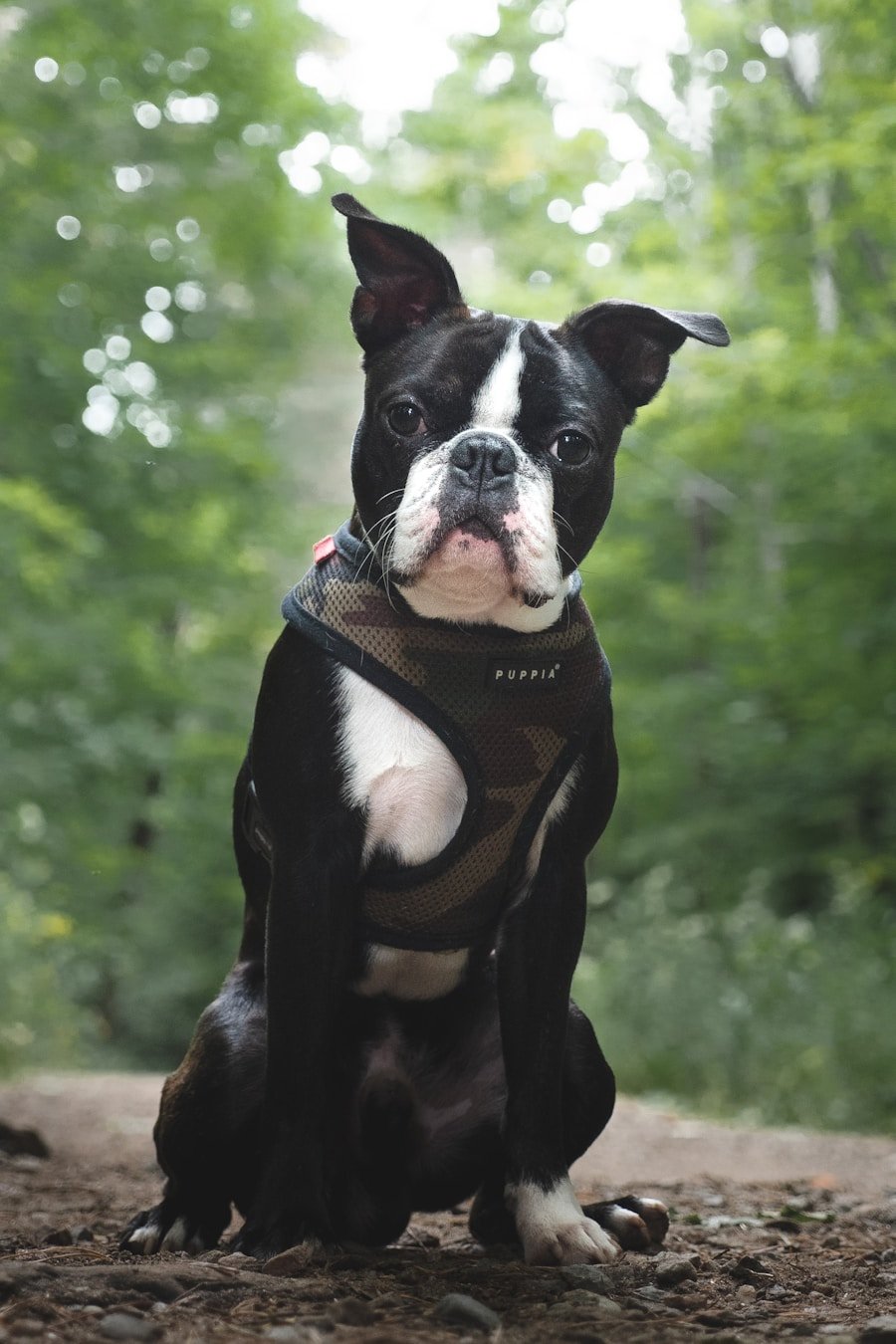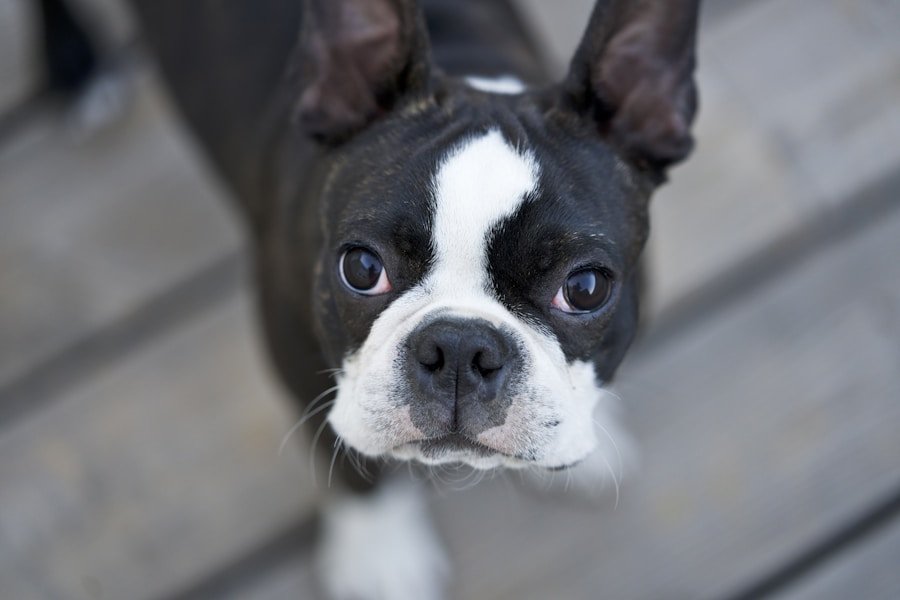Table of Contents
The Boston Terrier, often affectionately referred to as the “American Gentleman,” has a rich and fascinating history that dates back to the late 19th century. This breed originated in Boston, Massachusetts, where it was developed from a cross between the now-extinct English Bulldog and the English Terrier. The goal was to create a small, compact dog that possessed the tenacity of a bulldog but with a more refined appearance and temperament.
The breed quickly gained popularity among the upper class in Boston, and by 1893, the Boston Terrier was officially recognized by the American Kennel Club (AKC). As the breed evolved, it became known for its distinctive tuxedo-like coat, which is typically black and white. The Boston Terrier was bred not only for its looks but also for its friendly disposition and intelligence.
Over the years, these dogs have been cherished companions, serving as family pets and even participating in various dog sports. Their charming personality and adaptability have made them a beloved breed across the United States and beyond. Sure, here is the sentence with the link:
I love to learn about pet care on Pawwise.
Key Takeaways
- Boston Terriers were originally bred in the 19th century in the United States, and were recognized by the American Kennel Club in 1893.
- Boston Terriers are known for their friendly and gentle nature, making them great companions for families and individuals alike.
- Training and socialization are important for Boston Terriers to ensure they develop good behavior and manners.
- Boston Terriers require regular exercise and mental stimulation to keep them happy and healthy.
- Grooming for Boston Terriers is relatively low maintenance, with regular brushing and occasional baths to keep their coat clean and healthy.
The Characteristics and Temperament of the Boston Terrier
Physical Characteristics
Their coat is short and smooth, minimal grooming, which makes them an appealing choice for busy families or individuals
The breed’s signature tuxedo pattern adds to its charm, making them stand out in any crowd.
Temperament and Personality
Boston Terriers are known for their friendly and affectionate nature. They are highly social dogs that thrive on human interaction and companionship. These dogs are often described as lively and playful, making them great companions for children and adults alike.
Intelligence and Training
Despite their small size, they possess a confident demeanor and are known to be quite brave. Their intelligence makes them quick learners, but they can also be a bit stubborn at times, requiring consistent training and positive reinforcement.
Training and Socialization of Boston Terriers

Training a Boston Terrier can be a rewarding experience due to their intelligence and eagerness to please. However, it is essential to start training early to establish good habits and prevent any behavioral issues from developing. Positive reinforcement techniques work best with this breed; they respond well to praise, treats, and playtime as rewards for good behavior.
Basic commands such as sit, stay, and come should be taught early on to ensure a well-mannered companion. Socialization is equally important for Boston Terriers. Exposing them to various environments, people, and other animals from a young age helps them develop into well-rounded adults.
This breed can sometimes be wary of strangers or other dogs if not properly socialized. Regular trips to dog parks or puppy classes can provide valuable experiences that help them become more comfortable in different situations. A well-socialized Boston Terrier is typically friendly and confident, making them a joy to be around.
Exercise and Activity Requirements for Boston Terriers
| Age | Exercise Requirements | Activity Level |
|---|---|---|
| Puppy (2-6 months) | 15-20 minutes of playtime, 5 times a day | High energy, needs frequent play and socialization |
| Young Adult (7-12 months) | 30-40 minutes of exercise, 3 times a day | Moderate to high energy, enjoys walks and interactive play |
| Adult (1-8 years) | 45-60 minutes of exercise, 1-2 times a day | Moderate energy, enjoys walks, runs, and interactive play |
| Senior (9+ years) | 30-45 minutes of exercise, 1-2 times a day | Lower energy, prefers shorter walks and gentle play |
While Boston Terriers are small in stature, they are energetic dogs that require regular exercise to maintain their physical health and mental well-being. Daily walks are essential, as they help burn off excess energy and provide mental stimulation through exploration of their surroundings. A brisk 30-minute walk each day is usually sufficient for most Boston Terriers, but they also enjoy playtime in the yard or engaging in interactive games with their owners.
It’s important to note that Boston Terriers can be sensitive to extreme temperatures due to their short snouts. During hot weather, it’s crucial to monitor their activity levels and provide plenty of water and shade. On colder days, a doggy sweater may be necessary to keep them warm during outdoor excursions.
Overall, finding a balance between exercise and rest is key to keeping your Boston Terrier happy and healthy.
Grooming and Care for Boston Terriers
One of the many advantages of owning a Boston Terrier is their low grooming needs. Their short coat requires minimal maintenance; regular brushing with a soft brush will help remove loose hair and keep their coat looking shiny. Bathing should be done as needed, typically every few months or when they get particularly dirty.
Additionally, regular dental care is essential for this breed; brushing their teeth several times a week can help prevent dental issues. Beyond grooming, it’s important to pay attention to their ears and eyes. Regularly checking for any signs of infection or irritation can help catch potential health issues early on.
Keeping their nails trimmed is also crucial; long nails can cause discomfort and lead to mobility issues over time. Overall, with just a little effort in grooming and care, Boston Terriers can remain healthy and looking their best.
Health Concerns and Lifespan of Boston Terriers

Like all breeds, Boston Terriers are prone to certain health concerns that potential owners should be aware of. One of the most common issues is brachycephalic airway syndrome due to their short snouts, which can lead to breathing difficulties, especially in hot or humid weather. Additionally, they may be susceptible to eye problems such as cataracts or corneal ulcers due to their prominent eyes.
On average, Boston Terriers have a lifespan of around 11 to 15 years. Regular veterinary check-ups are essential for monitoring their health and catching any potential issues early on. Maintaining a healthy diet, providing regular exercise, and ensuring proper dental care can significantly contribute to their overall well-being.
By being proactive about their health needs, owners can help ensure that their Boston Terrier lives a long and happy life.
Boston Terriers as Family Pets
Boston Terriers make excellent family pets due to their friendly nature and adaptability. They are known for being good with children, often forming strong bonds with younger family members. Their playful demeanor makes them great companions for kids who enjoy interactive playtime or cuddling on the couch after a long day of activities.
They thrive on companionship and do not like being left alone for extended periods; thus, they fit well into family dynamics where they can receive plenty of attention and love. Their affectionate nature ensures that they become cherished members of any household.
Finding and Choosing the Perfect Boston Terrier for Your Family
When considering adding a Boston Terrier to your family, it’s essential to do thorough research before making a decision. Start by looking for reputable breeders who prioritize health testing and responsible breeding practices. Visiting the breeder’s facility allows you to see the living conditions of the puppies and meet the puppy’s parents, which can give you insight into their temperament.
Alternatively, consider adopting from rescue organizations or shelters that specialize in Boston Terriers. Many wonderful dogs are looking for loving homes, and adoption can be a fulfilling way to bring a new companion into your life. Regardless of where you choose to find your Boston Terrier, ensure that you take your time in selecting the right match for your family’s lifestyle and needs.
In conclusion, Boston Terriers are delightful companions known for their charming personalities and adaptability as family pets. With proper training, socialization, exercise, grooming, and health care, these lovable dogs can bring joy and companionship into any home for many years to come. Whether you’re a busy family or an individual looking for a loyal friend, the Boston Terrier may just be the perfect fit for you!
If you’re a fan of Boston Terriers, you may also be interested in learning about the adorable appeal of Scottish Fold cats. These unique felines have a distinct appearance and charming personality that make them a popular choice for cat lovers. To read more about Scottish Folds, check out this article on The Paw Wise.
FAQs
What is a Boston Terrier?
A Boston Terrier is a small, muscular dog with a sleek coat, distinctive tuxedo-like markings, and a friendly, lively personality. They are often referred to as “American Gentlemen” due to their dapper appearance.
What is the origin of the Boston Terrier?
The Boston Terrier breed was developed in the 19th century in the United States, specifically in Boston, Massachusetts. They are a crossbreed between the English Bulldog and the now-extinct White English Terrier.
What is the average size and weight of a Boston Terrier?
Boston Terriers are typically small to medium-sized dogs, with an average height of 15-17 inches and a weight of 12-25 pounds.
What is the temperament of a Boston Terrier?
Boston Terriers are known for their friendly, affectionate, and gentle nature. They are also intelligent, lively, and eager to please, making them great companions for families and individuals alike.
What are the exercise needs of a Boston Terrier?
Boston Terriers have moderate exercise needs and enjoy daily walks, playtime, and interactive activities. They are adaptable to various living situations, including apartments, as long as they receive regular exercise and mental stimulation.
What are the common health issues of Boston Terriers?
Some common health issues in Boston Terriers include brachycephalic syndrome (due to their short muzzle), eye problems, allergies, and joint issues. It’s important for owners to provide regular veterinary care and maintain a healthy diet and exercise routine for their Boston Terrier.


